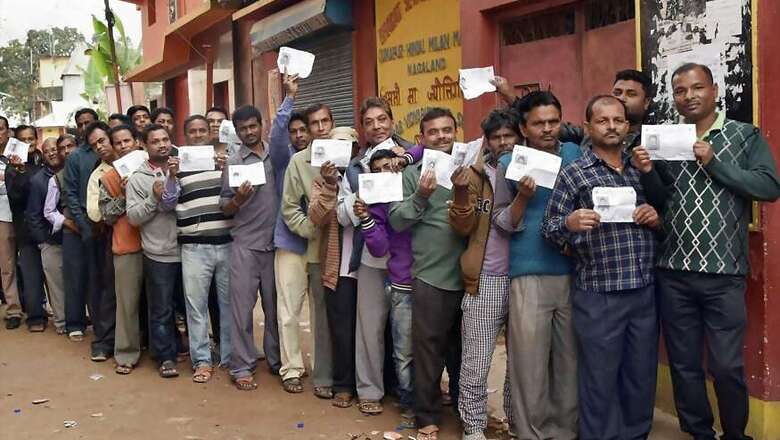
views
The general disinterest in the assembly elections in Maharashtra and Haryana, even among the press and political class, seems to spring from the perception that the result is a foregone conclusion and the only question is whether the main opposition party, the Congress, will end up in the second or third place.
This indifference runs counter to the spirit of our messy, feisty and combative democracy, which loves gladitorial contests and doesn't believe in one-horse shows. It also discounts the silent voter, who has a gift for springing surprises.
Given that the BJP is in power in both Maharashtra and Haryana, discussions should have centred around a tug-of-war between anti- and pro-incumbency, but the prevailing sentiment is that the TINA (there-is-no-alternative) factor has overshadowed all other variables.
Ahead of voting, opinion pollsters — who were all on the same page for once — had awarded the palm to the BJP and by a big margin. In Maharashtra, the BJP-led NDA was tipped to win just under half the popular vote, leaving the Congress-led UPA with about a third. In Haryana, where the two parties are going head to head, surveys predicted a three-quarters majority for the BJP. Significantly, the projections barely changed between September and October.
Political discussions in Maharashtra have focused on whether the Congress will come in after the Shiv Sena and the NCP. In Haryana, the likely performance of the Jannayak Janta Party led by Dushyant Chautala is of more interest than that of the Congress.
The Opposition as a whole, despite the efforts of individual leaders, shows no signs of having recovered from its brutal battering in the 2019 general elections. The Congress is not alone in its depressive state; the regional parties, be it the SP, BSP, TMC or RJD, are quite as apathetic.
At the root of their despair is the apparent disconnect between electoral and governance outcomes. In other words, anti-incumbency does not seem to influence voting choices. A voter who complains bitterly about unemployment and the economic crisis, will end up casting his ballot for the BJP.
The conventional response is to accuse the BJP of seducing voters with hyper-nationalism or to blame the RSS' Hindutva project. The other is to wonder whether politics itself has entered a new phase, where issues of concern are being effectively de-politicised.
Why are job losses, poor sanitation and lynchings not laid at Narendra Modi's door, but attributed to institutional failures? Obviously, this calls for intense analysis. Instead, we have a Congress driven by factionalism. In the run-up to elections, the party made headlines for all the wrong reasons: the exodus of leaders from the Congress and NCP in Maharashtra, the tussle between BS Hooda and Ashok Tanwar in Haryana.
The Congress still sees itself as an alternative national party, by itself or at the core of a credible coalition. But it seems unequal to the task of engaging the voter, content to go with the flow and wait for a turnaround triggered by citizens' disenchantment with the BJP.
This is becoming progressively unlikely, because the Congress finds itself overtaken by parties of the centre or centre-left. Once it is pushed to the third position, it never recovers. Uttar Pradesh, Bihar, Odisha and West Bengal are obvious examples. By contrast, the BJP is resilient; it bounced from number 4 to number 1 in UP in a matter of five years.
That said, not everyone is resigned to a BJP hegemony. The AAP, despite a 7-0 bashing in Lok Sabha 2019, is chirpy and confident and ready for battle in the Delhi assembly polls in January 2020. The South remains largely beyond the BJP's grasp and in the north-east, the party depends on a patchwork of regional forces to influence electoral outcomes.
The Opposition is duty-bound to remind voters that, romantic and idealistic though it may seem in a time of influential politico-economic cartels and money-driven elections, power does lie with the people. It needs to put up a fight and not merely by fielding candidates.
(The author is a senior journalist. Views are personal)
















Comments
0 comment